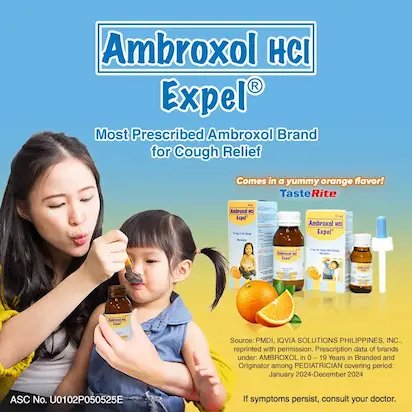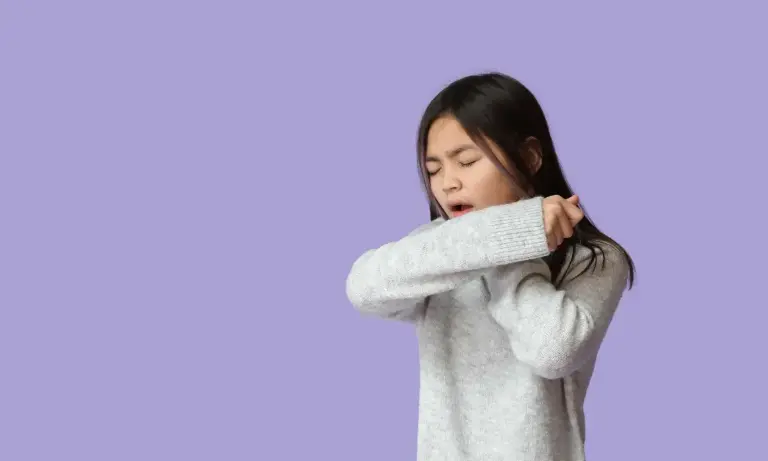Every parent wants to make the right call when their child is sick, especially with something as tricky as a cough with phlegm. With countless solutions out there, it’s normal to feel unsure about what to trust. Between traditional remedies, internet hacks, and well-meaning tips from family and friends, it can get overwhelming. Don’t worry! Here’s a research-backed list of remedies to help your child feel better.
Productive Cough Remedies for Kids
Coughing helps clear out mucus—but that doesn’t mean your kid has to stay uncomfortable. Here are some tips to help with cough symptoms.
1. Warm Fluids
Warm fluids can help thin your child’s mucus, making it easier for them to cough and clear their airways. They also soothe a sore throat and help keep your child hydrated—something that’s especially important when they’re sick.
You can offer homemade chicken soup or a mild herbal tea like chamomile. Just be sure to check the temperature before giving it to your child.
2. Honey (For Kids Over 1 Year Old)
Honey is a time-tested remedy for soothing coughs, especially those with phlegm. Its thick, syrupy consistency coats the throat, reducing irritation and calming the urge to cough. It also contains natural antibacterial and anti-inflammatory properties.
A half to one teaspoon before bedtime is often enough to provide relief. However, it's essential to note that honey should never be given to children under 1-year-old due to the risk of infant botulism (food poisoning caused by bacteria).
3. Saline Nasal Drops or Spray
Nasal congestion and post-nasal drip often make a child's cough worse, especially at night. Using a saline nasal spray or drops is one way to clear mucus from their nose and reduce coughing triggers. This is especially helpful if your baby or toddler isn’t able to blow his/her nose yet.
After applying the saline, you can gently suction out the mucus using a bulb syringe (a soft rubber device used to remove mucus). Pediatricians and ENT specialists often recommend this method to manage congestion and help prevent coughs caused by mucus buildup.
4. Cool-Mist Humidifier
Dry indoor air, especially during colder months or in air-conditioned environments, can make respiratory symptoms worse by drying out mucous membranes. A cool-mist humidifier adds moisture to the air, which helps loosen mucus in the nose and chest and soothes irritated airways.
While there isn’t much formal research on humidifiers, the American Academy of Pediatrics (AAP) supports their use as a supportive remedy for colds and coughs in children over warm vaporizers. Be sure to clean the humidifier daily to prevent mold and bacteria growth, which can worsen respiratory issues.
5. Chest Percussion (Gentle Tapping)
Chest percussion, also known as chest physiotherapy, involves gently tapping or patting the chest and back to help loosen mucus in the lungs. It’s used in hospitals for children with respiratory conditions like bronchiolitis (infection of the airways) or pneumonia.
A gentler version can be done at home under the guidance of your pediatrician. Place your child in a position where their head is lower than their chest (always supervise), and gently tap their back with a cupped hand.
6. Elevate the Head During Sleep
Kids often cough more at night because mucus builds up in the throat when they lie flat. Raising your child’s head a little while they sleep can help the mucus drain better, which may reduce coughing.
For toddlers and older kids, try using an extra pillow. For babies, never place a pillow in the crib—instead, ask your pediatrician about slightly raising the head of the mattress by placing a rolled towel underneath.
7. Proper Hydration
Encourage your child to drink fluids regularly throughout the day. For babies, this means offering breast milk or formula milk more frequently. For children one year and above, giving them cool water, diluted juice, or warm broths can be soothing and hydrating. Avoid carbonated or citrus drinks, as these can irritate a sore throat. Staying hydrated also supports the immune system and helps the body recover faster from illness.
8. Rest and Recovery Time
When your child has a cough with phlegm, his or her body needs downtime to recover and fight the infection. Physical activity can trigger more coughing and slow down the healing process, so it’s best to keep things low-key while your little one recovers. Additionally, adequate sleep and restful daytime routines help strengthen the immune system. Let your child rest as much as needed, and trust that their body is working hard to get better.
10. Over-the-Counter Medicines
Trying home remedies is a great start when dealing with your child's cough with phlegm. But sometimes, these solutions aren’t enough to clear all the mucus. In these cases, your pediatrician might suggest a mucolytic medicine to expel phlegm.
One product to keep in mind is Ambroxol HCl (Expel®)!
What Makes Ambroxol HCl (Expel®) a Pedia’s Choice in Expelling Phlegm?
Ambroxol HCl (Expel®) is the most prescribed branded ambroxol brand used for the relief of cough secondary to acute and chronic diseases of the respiratory tract accompanied by excessive lung secretions such as chronic bronchitis, asthmatic bronchitis, and bronchial asthma.
It contains Ambroxol, which helps break down mucus resulting in the production of less thick and less sticky mucus or phlegm. Ambroxol also aids in improving mucociliary clearance (mucus flow and transport), making it easier to cough up and expel phlegm.
Tasty Option for Your Kids
Expel has a yummy orange flavor (formulated with TasteRite Technology) for children who dislike a bitter taste, helping parents ensure that their kids take their medicine.
Suggested Usage
Ambroxol HCl (Expel®) should be taken orally (by mouth), as recommended by the doctor.
Babies 6 months and younger:
- 0.5 mL of the 6 mg/mL oral drops every 12 hours
Babies 7 to 12 months old:
- 1 mL of the 6 mg/mL oral drops every 12 hours
Toddlers 1 to 2 years old:
- 1.25 mL of the 6 mg/mL oral drops or 2.5 mL or half a teaspoon of the 15 mg/5 mL syrup, every 12 hours
Children 3 to 6 years old:
- 2.5 mL half a teaspoon of the cough syrup every 8 hours
Kids 7 to 12 years old:
- 5 mL (1 teaspoon) of the cough syrup every 8 to 12 hours
*Source: PMDI, IQVIA SOLUTIONS PHILIPPINES, INC., reprinted with permission. Prescription data of brands under: AMBROXOL in 0 – 19 Years in Branded and Originator among PEDIATRICIANS covering period: January 2024-December 2024
If symptoms persist, consult a doctor.
- Honey for treatment of cough in children - PMC | https://pmc.ncbi.nlm.nih.gov/articles/PMC4264806/
- Home Remedies for Cough in Kids – Children's Health | https://www.childrens.com/health-wellness/home-remedies-for-cough-in-kids-infographic
- A spoonful of honey helps a coughing child sleep - PMC | https://pmc.ncbi.nlm.nih.gov/articles/PMC3601686/
- How to Give Nasal Saline Drops to Babies and Kids | https://www.parents.com/health/cold-flu/cold/how-to-give-nasal-drops/
- Suctioning the Nose with a Bulb Syringe | Advice for Parents | https://www.cincinnatichildrens.org/health/s/suctioning-bulb-syringe#:~:text=A%20bulb%20syringe%20is%20used,baby%20to%20breathe%20and%20eat.
- Productive Cough in Children and Adolescents – View from Primary Health Care System - PMC | https://pmc.ncbi.nlm.nih.gov/articles/PMC5364784/#:~:text=If%20there%20is%20a%20productive,%2C%20viruses%2C%20fungi%20and%20parasites.
- Chest Physiotherapy - Infants Newborn to 12 Months | https://www.nationwidechildrens.org/family-resources-education/health-wellness-and-safety-resources/helping-hands/chest-physiotherapy
- Botulism - StatPearls - NCBI Bookshelf | https://www.ncbi.nlm.nih.gov/books/NBK459273/
- Beneficial effect of nasal saline irrigation in children with allergic rhinitis and asthma: A randomized clinical trial - PubMed | https://pubmed.ncbi.nlm.nih.gov/31012599/
- Botulism: Types, Causes, Symptoms & Treatments | https://my.clevelandclinic.org/health/diseases/17828-botulism
- How to Care for Your Child’s Cold - HealthyChildren | https://www.healthychildren.org/English/health-issues/conditions/flu/Pages/caring-for-Your-childs-cold-or-flu.aspx
- Vaporizer or Humidifier: Which Is Best? | Children's Hospital of Philadelphia | https://www.chop.edu/news/health-tip/vaporizer-or-humidifier-which-best#:~:text=While%20both%20are%20effective%20in,of%20a%20cool%20mist%20humidifier.
- Chest Physiotherapy - Infants Newborn to 12 Months | https://www.nationwidechildrens.org/family-resources-education/health-wellness-and-safety-resources/helping-hands/chest-physiotherapy
- Postural Drainage and Vibration - StatPearls - NCBI Bookshelf | https://www.ncbi.nlm.nih.gov/books/NBK604210/
- Calming Your Child's Cough | Children's Hospital of Philadelphia | https://www.chop.edu/news/health-tip/calming-your-childs-cough
- How to Handle a Cough | https://kidshealth.org/en/parents/cough-sheet.html#:~:text=Offer%20plenty%20of%20liquids%20(breast,nose%20drops%20to%20ease%20congestion.
- Home Remedies for Cough in Kids – Children's Health | https://www.childrens.com/health-wellness/home-remedies-for-cough-in-kids-infographic#:~:text=Elevate%20your%20child's%20head%20while,the%20back%20of%20the%20throat).
- The 10 Best Humidifiers for Baby | https://www.parents.com/best-humidifier-for-baby-8668948
ASC Reference No. U0194P062325E



